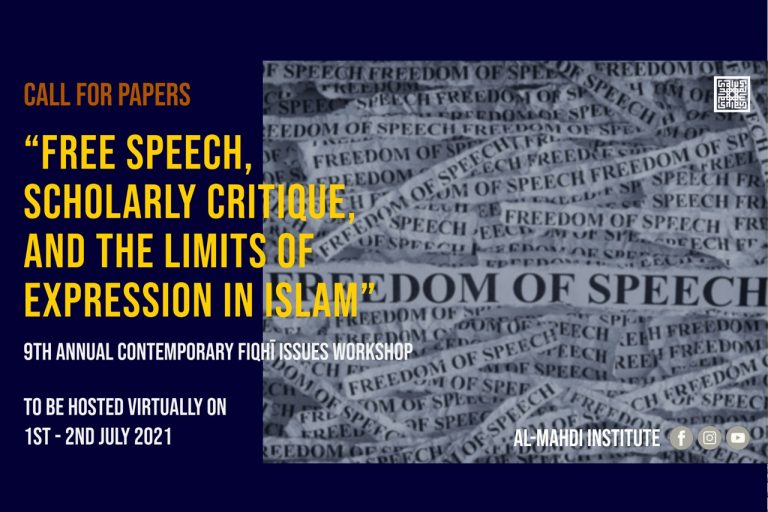“Free Speech, Scholarly Critique, and the Limits of Expression in Islam”

About The Event
The 9th Annual AMI Contemporary Fiqhī Issues Workshop
Call for Papers
Date: July 1-2, 2021
Venue: Online
Proposal Submission Deadline: March 31, 2021
Considering the current circumstances surrounding COVID-19, Al-Mahdi Institute (AMI) will host the Workshop virtually.
Many western liberal democracies uphold the right to free speech and expression as a fundamental freedom, which albeit not an absolute right, extends to the mockery of venerated figures. Critique of Islam and ridicule of the Prophet Muhammad have disconcerted some Muslim factions. As a result, some Muslim jurists condemn many expressions that fall under the rubric of free speech in liberal democracies as blasphemy, which they consider to be a punishable crime.
Considering ongoing tensions and the perception that critique of religion is not tolerated in Islam, the 9th Annual Contemporary Fiqhī Issues Workshop, hosted by the Al-Mahdi Institute, seeks to provide a virtual forum for discussions surrounding free speech, scholarly critique, and the limits of expression in Islam.
The Workshop invites papers from seminarian trained jurists or those with an understanding of the traditional seminarian system that shed light on how freedom of expression and its limits are understood in the Muslim legal discourse and the extent to which it may be influenced by various socio-political factors.
These important contemporary questions at the intersection between political theory and jurisprudence are positioned within broader discussions regarding the parameters of expression within Islam. As such, the Workshop welcomes a range of papers from multidisciplinary backgrounds dealing with, but not limited to:
• Philosophical, theological, and ethical analysis regarding freedom of
• Analysis of the scope and limits of free thinking and scholarly critique in
• Analysis of legislation in both Muslim and non-Muslim countries relating to the freedom of expression and
• Empirical research analysing the lived experiences of Muslims and the impact of the discourse on gender relations, intra and inter-faith relations, and societal relations.
Proposals and queries should be sent by e-mail to: Mahdiyah Abdul-Hussain.
Source: Almahdi.edu


We're always eager to hear from you.
If you’d like to learn more about us or have a general comments and suggestions about the site, email us at